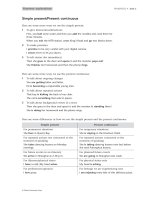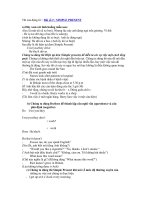Simple Present Verbs (excercise) pptx
Bạn đang xem bản rút gọn của tài liệu. Xem và tải ngay bản đầy đủ của tài liệu tại đây (999.56 KB, 18 trang )
Simple Present Verbs
Simple Present Verbs
Simple Present Verbs
They are the right verb form for
They are the right verb form for
normal conditions and facts.
normal conditions and facts.
Generated by Foxit PDF Creator © Foxit Software
For evaluation only.
Use simple present for the usual.
• The simple present indicates common, everyday
activities and conditions:
Verbs to use: want, take, and eat.
1. Most people __ lunch around noon
everyday.
(It is no surprise; it’s just a commonality.)
2. Students __ quizzes in the class.
(Quizzes are normal parts of classes.)
3. The babysitter __ more money to watch
the kids.
(She wants more money not just today, but
everyday.)
Generated by Foxit PDF Creator © Foxit Software
For evaluation only.
Use simple present for facts.
• We express facts in the simple present.
Verbs to use: prescribe, cost, and get:
1. Hurricanes ___ insurance companies
millions of dollars each year.
2. Nurse practitioners ___ medications
just like medical doctors.
3. Criminal justice majors ___ jobs in law
enforcement.
Generated by Foxit PDF Creator © Foxit Software
For evaluation only.
Negate action verbs with don’t.
• To make negatives, action verbs
combine with don’t or doesn’t:
1. Most students have jobs, but some __.
2. Ericka __ work at any job at all.
3. __ forget to finish your homework.
4. The professor __ finish the quiz yet.
5. __ you still have homework to do?
Generated by Foxit PDF Creator © Foxit Software
For evaluation only.
Negate be verbs with not.
• Negate am, are, and is with not:
1.
I’m an instructor. I __ a technician.
2. There __ enough computers for everyone.
3. The college __ responsible for your books.
4. The parking lot __ big enough for all cars.
5. We __ learning Chinese in this course.
6. It __ necessary to memorize everything.
7. You __ required to write an essay yet.
Generated by Foxit PDF Creator © Foxit Software
For evaluation only.
Use do in yes-no questions.
• Begin yes-no questions with action verbs
with do
or does.
1. __ most college students borrow money to
pay their school bills?
2. __ your friend Miguel take English
Composition class?
3. __ you read faster than you write?
4. __ the weather look good today?
5. __ you feel better when you pass quizzes?
Generated by Foxit PDF Creator © Foxit Software
For evaluation only.
Frequency words front action verbs.
• Put frequency words before action verbs.
Words: always, often, rarely, never, and usually
1. Our class __ meets in its normal room.
2. We __ go out to the language lab.
3. The professor __ misses our class.
4. The sun __ shines in the summer.
5. Weak students __ miss classes.
Generated by Foxit PDF Creator © Foxit Software
For evaluation only.
Frequency words follow be verbs.
• Put frequency words after BE verbs.
Use always, often, rarely, never, and usually
1. Our class is __ in the normal room.
2. We are __ in the other language lab.
3. The professor is __ out of our class.
4. The sun is __ shining in the summer.
5. Weak students are __ out of classes.
6. This class is __ boring; it’s __ interesting.
7. The police are __ watching for speeders.
Generated by Foxit PDF Creator © Foxit Software
For evaluation only.
When do verbs add –s?
• Add the –s to verbs after he, she, and it:
1. Guadalupe __ a good student.
2. He seem_ to know most things.
3. He preview_ course information.
4. Rarely do_ he get less than a B.
5. Everyone know_ he will pass the class.
6. His boss __ him doing many projects.
7. How far he go_ depends on his desire.
Generated by Foxit PDF Creator © Foxit Software
For evaluation only.
Can you use non-action verbs?
• Non-action verbs such as
is, become,
and
seem
show existence and are not progressive.
Use: be, seem, appear, become.
1. Good learners __ to have many study skills.
2. They __ in their textbooks a lot of the time.
3. On tests, they __ even more focused.
4. They __ in class on time almost everyday.
5. They __ ready to study to __ successful.
6. They also __ always ready to participate.
Generated by Foxit PDF Creator © Foxit Software
For evaluation only.
Short answers to do questions
• Answer do questions with either yes or
no with a pronoun and do or does.
1. __ you work in the evening?
Yes, I __. I go there after classes.
2. __ your father work in a factory?
Yes, he __. He works at Shaw.
3. __ all students have jobs?
No, they __. Some students __ have
to work any job.
Generated by Foxit PDF Creator © Foxit Software
For evaluation only.
Can you answer questions with be?
• Short answers to be questions begin with yes
or no and include the be verb:
1. Are you taking an ESL class?
Yes, I __. I __ in Intermediate ESL.
2. Is Eva a college freshman?
No, she __. She __ in her second year.
3. Are there any Asian students in our class?
Yes, there __. They __ over there.
4. Is your brother in this class?
No, he __. He __ still in high school.
Generated by Foxit PDF Creator © Foxit Software
For evaluation only.
Can you use simple present?
• Use is, do, know, see
1. __ you __ that guy?
2. The one that __ in
the hallway?
3. Yes, he __ my best
friend.
4. Oh, __ you __ him?
5. Sure, he __ my
cousin.
6. What __ his name?
Do cell phones and computers
always help communication?
Generated by Foxit PDF Creator © Foxit Software
For evaluation only.
Can you use simple present?
• Use don’t, visit,
live, stay, eat, go.
1. College students __
on or near campus.
2. They __ in campus
cafeterias.
3. Tourists __ in hotels
and motels.
4. They __ interesting
places for fun.
5. Tourists __ __ to
work.
What makes the hotel
above look cheap?
Generated by Foxit PDF Creator © Foxit Software
For evaluation only.
Can you use simple present?
• Use take, learn, study,
attend, become, work.
1. Many students __
college to __ nurses.
2. Nurses must __ for
at least two years.
3. They __ about the
body and medicines.
4. Nurses __ in clinics
and hospitals.
5. They __ care of all
kinds of patients.
Is the nurse
above correct?
Generated by Foxit PDF Creator © Foxit Software
For evaluation only.
Can you use simple present?
• Use have, look,
like, do, want.
1. Some people __
small towns.
2. They prefer to __ a
calm and quiet life.
3. Others __ to live in
populated cities.
4. They __ for action
and adventure there.
5. What kind of
community __ you
prefer?
How do people feel
stuck in traffic?
Generated by Foxit PDF Creator © Foxit Software
For evaluation only.
Can you use simple present?
• Use have, need,
are, is, and keep.
1. There __ many
factors in success.
2. First, you __ a goal.
3. Then motivation __
helpful.
4. Winners of course
__ good attitudes.
5. Last, successful
people __ trying.
Do winners cheat?
Generated by Foxit PDF Creator © Foxit Software
For evaluation only.
Can you use academic words?
• Use: community, participation, factor,
cultural, and response.
1. A small town usually is a friendly __.
2. Say hello, and you’ll get an answer in __.
3. One reason or __ is that everyone knows
everyone else in town.
4. Its social side is more developed than its __.
5. Everyone comes together for __ to support
the high school sports teams.
Generated by Foxit PDF Creator © Foxit Software
For evaluation only.









